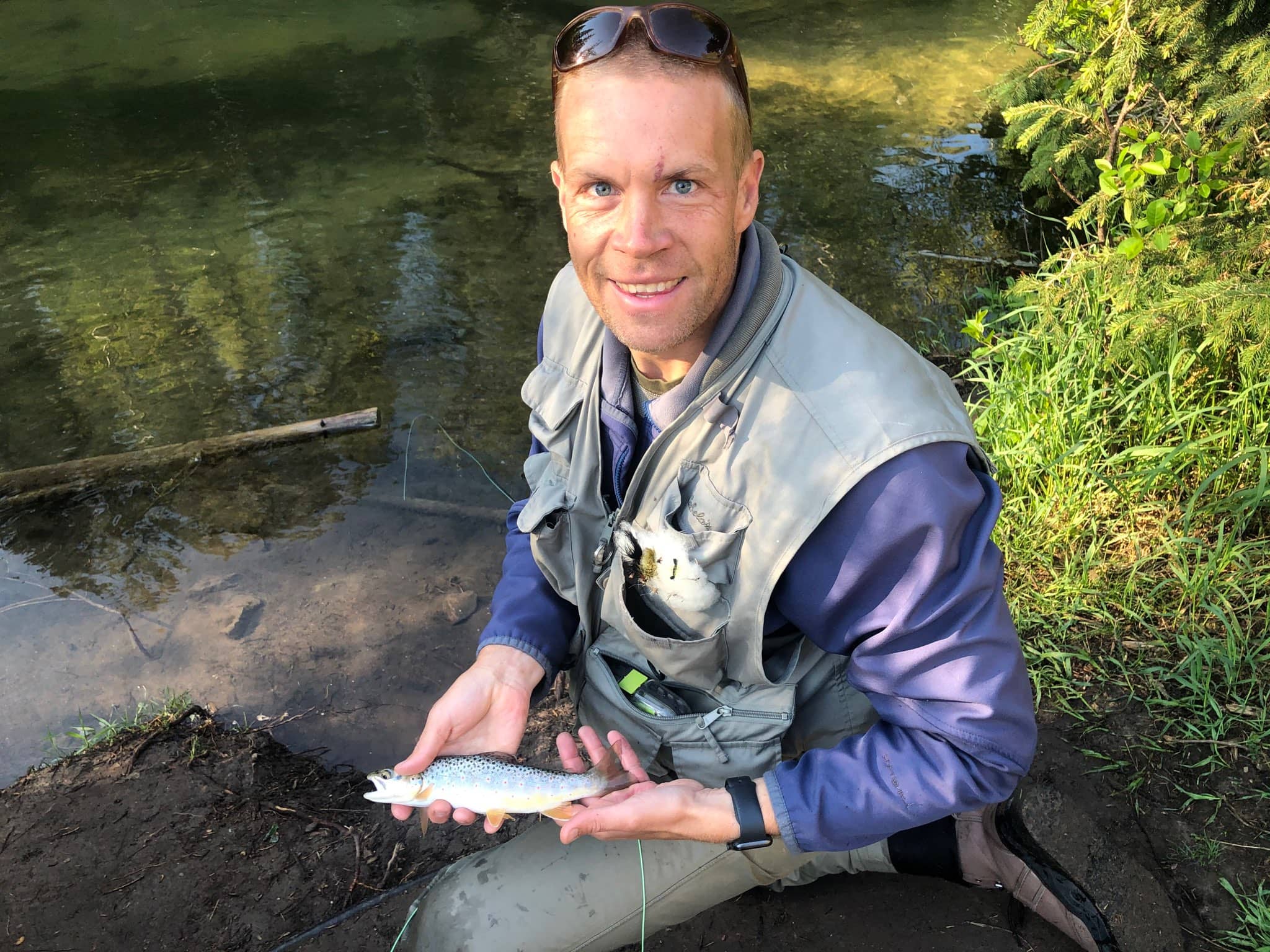
By Nick Simonson
In the pool before me on Spearfish Creek sat so many trout I could hardly contain myself.
Having scouted the run the day before, my jaw dropped as brookies, browns and rainbows lazily sat all within a foot of each other, rising and picking off the unseen midges in the surface film or nibbling on the insects that bounced along the bottom. Sleep had been hard to come by, and not just because of the ten family members packed into the cabin deep in the Black Hills of South Dakota, as I checked the time on my phone at least twice during the night. I gave in around 3:30 a.m., rolled out of bed and after a courtesy hour and a tumbler of coffee, woke my brother to beat the crowds that I had seen the day before. With the early dawn, we headed out to meet the fish about a 25-minute drive away.
I gave him the upper stretch of the pool, and I hunkered down at the bottom, planning an upstream cast as I watched the fish rise from behind my bunker of a fallen log which formed a dam extending from shore into the flow, and a young spruce tree, pungent and green with new spring growth. To my right, a small opening allowed for a back cast, and the upstream area was protected by a taller, more established spruce on the far side of the four-foot clearing. As I tucked in against the smaller pine, the scent of the needles rubbed off on my shoulder, masking my fresh-out-of-bed musk for just a moment as I readied my cast. I hauled back a third time, preparing to let the line go, and with the overexertion, placed the fly promptly in the top of the guardian spruce to my right.
Rising to my feet in a crouched walk, I snuck out from my position and untangled the tippet from the top of the pine, circled back around the opening and dug back into the branches of the smaller spruce. The scent again wafting up and reminding me of Christmas, only this time the multihued presents were still finning along in the current of the clear creek in front of me. I looped the line on the ground beside me and began my back cast, throwing two false casts out over the water with the tiny Adams fly at the end of the spider-silk-thin tippet. I watched in anticipation as it floated over the heads of a dozen trout, with most of them ignoring it and only a couple smaller ones showing some interest, perhaps due to their inexperience in the water, when compared to the larger fish holding tight.
The line curled down around the fallen log and I stripped it back in, beginning my back cast from my knees once again. Getting greedy for a shot at the far shoreline, where the trout were less likely aware of my bumbling presence tucked in among the shoreline pines, I placed my third throw back into the top of the spruce on my right. Growing frustrated with myself, I waddled back toward the road, circled around, reached up to the extent my arm would go, bent the top of the tree down and untangled the fly from the apex and tossed it back toward my position.
At this point, my brother – new to the pastime and early frustrations of fly fishing – wandered down. Having sacrificed a couple flies to similar shoreline obstructions, I offered him up a gray mosquito pattern and told him to mind the trees, with a half-hearted laugh. Lamenting that if only I could get a cast off, I think I could turn one of the trout in the high-traffic area before the day began and others started to arrive for sightseeing and the shared gawking that I had partaken in the day before. He commented on my crouch, and I explained that it was somewhat like deer hunting, as I pumped twice and the line zipped out across the water, right ahead of the line of trout on the far side of the creek.
Ecstatic at the small victory, I waited as the front of the line of fish turned down my offering, and I glanced back at my brother who also watched the drift with some intensity. Turning back to the fly, I saw only a swirl and my line go tight. Setting the hook with a lift, the surface of the pool exploded with a flipping and jumping brown, and trout of all stripes scattered and sprinted toward the front of the area of flatwater. I knee-walked to the water’s edge and raised the rod, bringing the small brown to hand between the two trees, the piney scent still wrapping me in the freshness of the morning and the smile stuck to my face like the tiny dry fly in the corner of the fish’s mouth. In between the two trees, I released the brown trout back into the flow, content with the victory.
While I’d offer up a few more casts – some which would find the water and some which would find the tree again – I called the 30-minute stint a win, and the memory of my first wild Black Hills stream trout was wrapped and tucked away as tightly as the coils of line and leader in the boughs of a spruce tree from an errant backcast.
